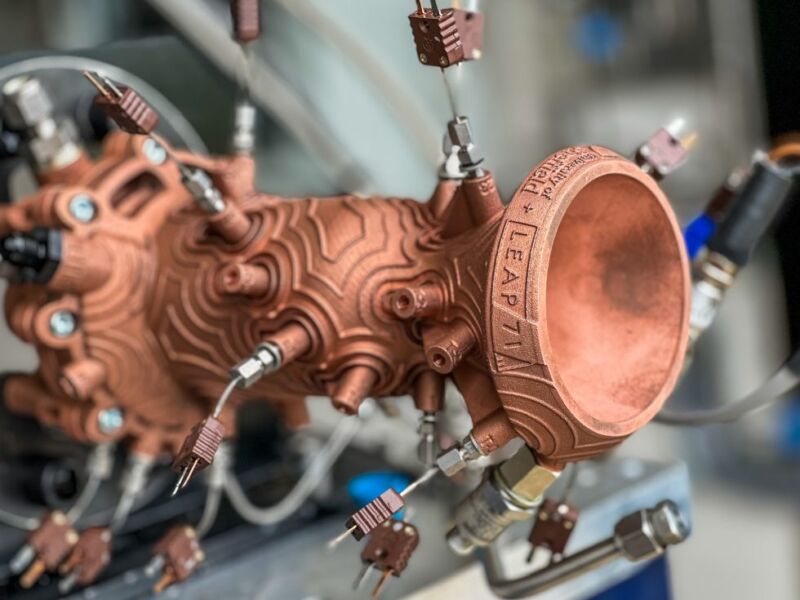
LEAP 71
Welcome to Version 6.49 of the Rocket Report! I need to open this week’s report with a hearty congratulations to Rocket Lab for the corporate’s fiftieth launch since Electron’s debut in 2017. It is a tremendous achievement for an organization based in New Zealand, a rustic with nearly no house program.
As all the time, we welcome reader submissions, and should you do not need to miss a problem, please subscribe utilizing the field beneath (the shape is not going to seem on AMP-enabled variations of the positioning). Every report will embody data on small-, medium-, and heavy-lift rockets and a fast look forward on the subsequent three launches on the calendar.

Electron celebrates its fiftieth. On Thursday, Rocket Lab launched its fiftieth Electron mission, “No Time Toulouse.” The mission efficiently deployed 5 Web-of-Issues satellites for the French firm Kinéis. It is a good milestone for the corporate based by Peter Beck in New Zealand. With this mission, Rocket Lab turns into the quickest firm to go from one launch to 50 launches of a privately developed rocket, surpassing even SpaceX. The corporate’s first Electron mission happened seven years in the past.
A uncommon feat… “The launch trade just isn’t a straightforward or forgiving one. Making it to your first launch just isn’t a given, so reaching 50 Electron launches is a gigantic achievement and a uncommon feat within the historical past of spaceflight,” Beck mentioned. Ars may have extra about this feat, the previous, and the way forward for Rocket Lab in a forthcoming article based mostly on a latest interview with Beck.
Isar raises $70 million extra. Germany-based small launch car developer Isar Aerospace has raised greater than 65 million euros ($70 million) in an extension of an earlier funding spherical, Area Information stories. The corporate mentioned Thursday that its “prolonged” Collection C spherical was now valued at 220 million euros, bringing its complete fundraising up to now to 400 million euros. That is greater than another launch startup in Europe. It is a formidable complete.
Lighting up the spectrum... Among the many individuals within the newest spherical is the NATO Innovation Fund, a brand new enterprise fund backed by 24 of NATO’s 32 member states. The corporate mentioned the extra funding will go towards efforts to scale up manufacturing of its Spectrum small launch car. Isar is advancing towards stage testing of the Spectrum rocket, which is meant to hold 1 metric ton to low-Earth orbit. The car’s debut launch might happen subsequent 12 months. (submitted by Ken the Bin and EllPeaTea)
Rocket Lab inks huge Electron contract. The launch firm mentioned this week it has signed the most important Electron deal in its historical past with the Japanese Earth commentary firm Synspective. The Japanese agency agreed to buy an extra 10 launches on Electron. Rocket Lab has been the only launch supplier for Synspective since 2020, efficiently launching 4 missions for the corporate up to now. (This announcement explains why, after I interviewed Rocket Lab chief Peter Beck this week, he was in Japan.)
A optimistic expertise on Electron… Along with the ten new devoted launches signed this week, one other two launches for Synspective have already been booked and are scheduled to fly this 12 months from Launch Complicated 1 in New Zealand. The launches within the new deal will happen from 2025 to 2027. “This settlement provides us a stable basis and confidence, as Rocket Lab is an progressive launch supplier,” mentioned Motoyuki Arai, the founder and chief government of Synspective. (submitted by Ken the Bin)
Matthew Brown to be taken down? The US Securities and Change Fee has sued a self-proclaimed enterprise capitalist, Matthew Brown, for making a “bogus provide” to amass Virgin Orbit within the weeks earlier than the launch firm went bankrupt. In keeping with the lawsuit filed Monday and reported by Bloomberg, Matthew Brown “made false and deceptive statements and omissions about his funding expertise and funds out there to make such a suggestion.” The SEC asserted that Brown despatched Virgin Orbit a fabricated screenshot of his firm’s checking account, claiming it held $182 million when, in actuality, it had a steadiness of lower than $1.
Brown intends to combat the allegations… “The SEC’s criticism is crammed with egregious errors, fabrications, and biased allegations that undeniably favor the perpetrator, Virgin Orbit’s Administration,” an announcement from a consultant for Brown and his corporations mentioned. Brown’s intervention got here within the ultimate days earlier than Virgin Orbit declared chapter, because the small launch firm sought to discover a purchaser to protect its LauncherOne rocket. Dan Hart, the previous chief government officer of Virgin Orbit, instructed the publication that the Brown bid was “an unneeded distraction” when the management workforce was “looking for a path ahead for the corporate.” Finally, no such path might be discovered.
Autonomously designed engine is fired up. A Dubai-based firm, LEAP 71, says it has developed a “Giant Computational Engineering Mannequin” that may autonomously design rocket engines. To that finish, LEAP 71 co-founder Lin Kayser mentioned the corporate’s engineering mannequin autonomously designed a small rocket engine in two weeks. Then the kerosene-liquid oxygen engine was 3D printed in copper and check fired. With 1,124 kilos of thrust, the engine generated 20,000 horsepower and accomplished all of its assessments, together with a long-duration burn, the corporate mentioned.
Placing the fast in fast iteration… “Every new design iteration takes solely about quarter-hour and is able to print once more,” Kayser instructed Ars in an electronic mail. “The thought is to cut back engineering time and maximize testing iterations. Most rocket startups are nonetheless caught within the lengthy means of reengineering once they get their check outcomes; we hope to remove that.” Notably, the corporate additionally claims that is the primary liquid-fueled rocket engine to be developed within the United Arab Emirates.


